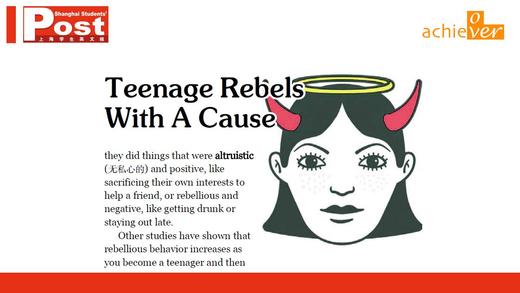《高中英语外刊阅读语篇精选》(第6辑)配套精品课

订阅专栏后播放音频

ssp


课程详情
【本课讲解文本和要点】
Teenage Rebels With A Cause
• rebel: rebellious
① Teenagers are paradoxical. That’s a mild and detached way of saying something that parents often express with considerably stronger language. But the paradox is scientific as well as personal. In adolescence, helpless and dependent children who have relied on grownups for just about everything become independent people who can take care of themselves and help each other. At the same time, once cheerful and compliant children become rebellious teenage risk-takers, often to the point of self-destruction. Accidental deaths go up dramatically in adolescence.
• paradoxical
• detached
• stronger language
• grownup
• compliant: comply
• rebellious: rebel
• risk-takers
• adolescence
② A new study published in the journal Child Development by Eveline Crone of the University of Leiden and colleagues suggests that the positive and negative sides of teenagers go hand in hand. The study is part of a new wave of thinking about adolescence. For a long time, scientists and policy makers concentrated on the idea that teenagers were a problem that needed to be solved. The new work emphasizes that adolescence is a time of opportunity as well as risk.
• go hand in hand
• a new wave of thinking
• policy makers
• work
③ The researchers studied “prosocial” and rebellious traits in more than 200 children and young adults, ranging from 11 to 28 years old. The participants filled out questionnaires about how often they did things that were altruistic and positive, like sacrificing their own interests to help a friend, or rebellious and negative, like getting drunk or staying out late.
Other studies have shown that rebellious behavior increases as you become a teenager and then fades away as you grow older. But the new study shows that, interestingly, the same pattern holds for prosocial behavior. Teenagers were more likely than younger children or adults to report that they did things like unselfishly help a friend.
• prosocial: pro+social
• fill out questionnaire
• altruistic: selfless/unselfishly
• sacrifice sth. to do
• fade away
• hold
• unselfishly
④ Most significantly, there was a positive correlation between prosociality and rebelliousness. The teenagers who were more rebellious were also more likely to help others. The good and bad sides of adolescence seem to develop together.
Is there some common factor that underlies these apparently contradictory developments? One idea is that teenage behavior is related to what researchers call “reward sensitivity.” Decision-making always involves balancing rewards and risks, benefits and costs. “Reward sensitivity” measures how much reward it takes to outweigh risk.
• a positive correlation between
• sensitivity: sensitive
• outweigh: out+weigh
⑤ Teenagers are particularly sensitive to social rewards — winning the game, impressing a new friend, getting that boy to notice you. Reward sensitivity, like prosocial behavior and risk-taking, seems to go up in adolescence and then down again as we age. Somehow, when you hit 30, the chance that something exciting and new will happen at that party just doesn’t seem to outweigh the effort of getting up off the couch.
The study participants filled out a separate “fun-seeking” questionnaire that measured reward sensitivity with statements like “I’m always willing to try something new if I think it will be fun.” This scale correlated with both prosociality and rebelliousness.
• impress
• getting…to
• hit
• outweigh
• scale
• correlate with
⑥ What’s more, the researchers were able to track the responses of participants over a four-year period and found that those who had been most eager for experience when they were younger became the most rebellious teenagers — but also the most altruistic.
This new research suggests that Cyndi Lauper was right: Girls (and boys) just wanna have fun, and that’s what makes them into paradoxically good and bad, rebellious and responsible teenagers.
• track